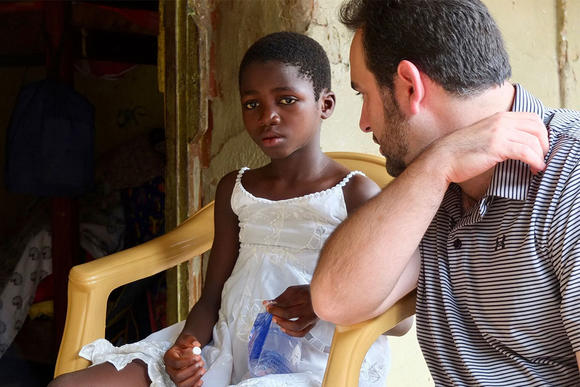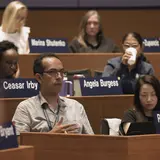
Lessons from Global Network Week in Ghana
Frank Ciminiello ’19 reflects on the challenges and opportunities he witnessed in and around Accra.

On a plastic chair, she sat off to the side in a thin white shirt, refusing the needlestick. Fever and weakness were upon her, yet she would not allow the staff to test her for malaria. Only when the volunteer and her new friend—an American graduate student on a volunteer program at the orphanage—came back did Angelica even consider allowing the test. That is how the orphanage survived: through scattered volunteers, zero government assistance, philanthropic Ghanaians, and day by day. For Angelica, 10 years old by calendar but appearing no older than eight, it was no different. The food and financial donations given that day, coordinated by Yale School of Management Executive MBA student Phoenica Fitts and University of Ghana Business School coordinator Yvonne Barnieh, would help for a day or two, hopefully long enough for her test to come back and for her to start feeling better.
Such began our Global Network Week trip to Accra, Ghana—a site visit to an orphanage in a surrounding village a mere one-hour drive away, yet so much further when measured in resources, from the capital city. That Sunday-afternoon trip, done by many of us between completing our State and Society final paper and Operations Engine final exam, offered a preview of our Global Network Week and pending curriculum. The following day we arrived late to the UGBS campus: the new building lacked a street address, and, as a result, nearly all of our Uber drivers got lost. Once there, we all learned about our case assignment for the week; the new UGBS executive campus to learn about our case assignment for the week: to develop a plan to ensure the financial stability of the new state-of-the-art University of Ghana Medical Center. Completed two years ago, it had yet to treat a single patient due to financial uncertainty. That first day, we were introduced to the Ghana health system, to Ghana politics, and to the concept of a private-public partnership for the new hospital. Later that week, we had a site visit of the facility including time with the interim CEO. Three days later, our group of business students from Ghana, Tokyo, Madrid, Berkeley, and Yale presented a realistic opportunity for financial stability for the country’s newest healthcare facility.
Fresh off our presentation, we traveled out of Ghana. Our first stop was Kakum National Forest, where we walked on a canopy, 40-plus meters above the jungle floor. Afterward, we ate lunch at a nearby resort, and then ended our sightseeing with a tour of Elmina Castle. More than 500 years old, the castle was a fort built originally to protect the fishing industry off the coast of Ghana. It was then used for several hundred years as holding cells for Africans about to shipped overseas to become enslaved people. Now, it is used as a museum, a way to emotionally and visually connect with its horrible past. Our tour guide, Ato Ashun, a local scholar on the castle, spoke eloquently about many of the unspeakable actions that took place there over those hundreds of years, all within a stone’s throw of the original church built in the fort’s courtyard. Concluding the tour, he said, “We may not all live to see an African empire so powerful and strong as to compel the respect of all mankind, but in our lifetime, we can work and act to make that a possibility within another generation.”
In the end, his words served as a beacon for us all, and an unexpected summation of our trip. A new hospital, a point-of-care malaria test, a city with Uber drivers—all of these advances existed alongside an underfunded orphanage, an unopened new hospital, and a new building without a street address. Ghana is still a developing country with potential for large steps forward. And, whether it be in the brief time spent at an orphanage outside of the city, or by proposing a new business model for an unopened medical center, we got the chance to learn from and help build that area. And in so doing, we have the opportunity to become leaders in business and society. For me, that means connecting the medical knowledge and technology that the new hospital represents with all the patients who need it the most, like the orphan girl with a fever.



